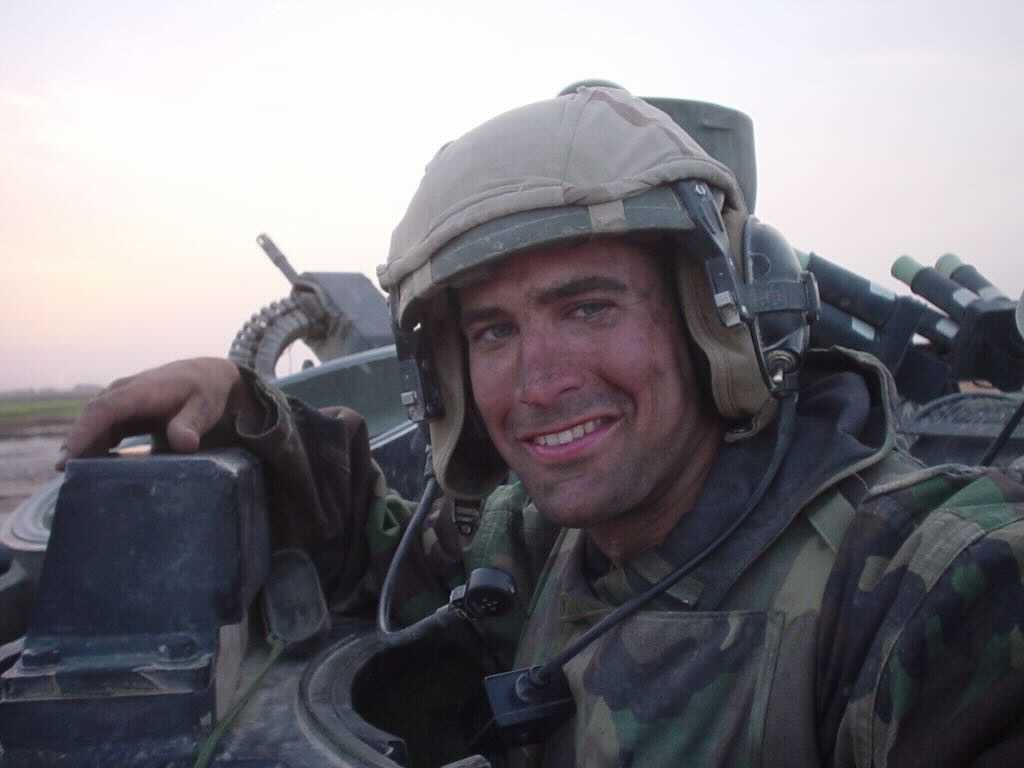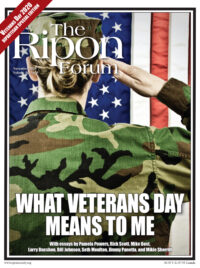
way to Baghdad.
I’m from New England so I’m used to cold nights, but the coldest night of my life was actually in one of the world’s hottest countries: Iraq. It was early in the invasion and we were dug into mud during a freezing rain. Our intelligence reports told us to anticipate an entire Iraqi armored division, with their best Russian tanks, to hit us that night. The basic assessment was that we were screwed. Our tanks wouldn’t arrive in time, and although the intel later proved wrong, it was a frightening situation, in addition to being freezing.
There was a moment, lying shivering in my fighting hole, that I thought to myself, “Why the hell am I here?” Here I was, going to die in this patch of mud nobody’s ever heard of, while all my friends back home were out at bars in Boston. I guess my parents, who told me joining the Marines was a terrible idea because I would get myself killed, were right. And for about ten seconds, I thought I had made a terrible mistake.
But only ten seconds, because then I remembered why I had signed up. I wasn’t a sucker, and neither were the Marines beside me. I signed up because I didn’t want anybody to go in my place. Because I didn’t want to be sitting in a bar back home when one of my friends was fighting for my freedom. And for the rest of the night, I felt a little warmer and a lot happier because I remembered that. On that miserable night in a land far away in a war that probably shouldn’t have happened, I was exactly where I wanted to be.
Truly believing in service—in servant leadership—is what gets us through.
This Veterans Day, I’m thinking about every American who serves our country. Service to others is the only way any of us can ultimately justify freezing in the mud, sweltering in the jungle, or being stuck deep beneath the Arctic Ocean in a pressurized metal tube. Truly believing in service—in servant leadership—is what gets us through.
These experiences can also take an often unseen and unexpected toll, and over the past year or so, I’ve talked about managing post-traumatic stress from my own four tours in the Marine infantry in Iraq. When one of us talks about PTS, we break the stigma that prevents others from getting help. And that ultimately saves lives.
It’s why I also advocate for a revolutionary approach to mental health care: making it routine. Just like an annual physical or teeth cleaning, mental health checkups should be routine. Last year, I got Congress to mandate mental health checkups for service members who experienced combat as soon as they return from the battlefield. This year, I continued that work, expanding the mandate to service members who participate in warfighting but aren’t deployed to war zones, like drone operators. I’m thankful that veterans in Congress from both parties, some of whom have essays in this collection, helped me advance that legislation.
We also need to make it easier for service members to seek help outside the chain of command. The Brandon Act, a bill named for Brandon Caserta, a sailor who was bullied and died from suicide because he couldn’t get help outside of his chain of command, would allow service members to anonymously report and seek mental health treatment by using a safe phrase like “Brandon Act.”
Every American—from veterans, to moms with postpartum depression, to young people struggling with their identity—deserves mental health care that’s easy to get. A few weeks ago, Congress passed the National Suicide Hotline Designation Act, a bill that I co-wrote with fellow veteran Chris Stewart (R-UT). It will become law this year, which means pretty soon anyone, anywhere in America will be able to dial 9-8-8 to get help with mental health.
This Veterans Day, as you reflect on your service or the service of someone you know, remember that it comes at a significant cost. If you haven’t served the country, find a way to serve those who have. Start a conversation with a veteran to better understand the cost of war. Get your lawmaker to sign on to good mental health care policy. And hold your leaders accountable when they fail those who volunteer to serve our great country.
Seth Moulton represents the state of Massachusetts in the U.S. House of Representatives where he serves on the House Armed Services Committee. Congressman Moulton joined the Marines in 2001, months before the 9/11 attacks.




